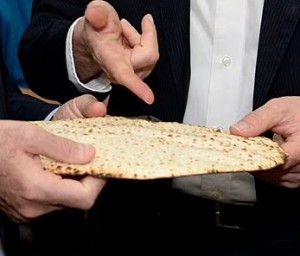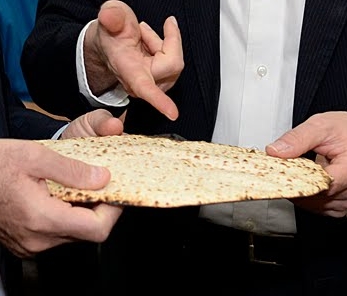
Shabbos Night
WE MADE it, thank God. We’ve made it to another Pesach, something most of us just took for granted two years ago would always be the case. If you were young enough and healthy enough, you could just assume that you’d be back for more Pesach cleaning next year, and yet another Seder.
Not this year. How many people were lost to the virus this past year who thought they’d be here this year? At least WE thought they’d be here this year. Those who made it through this year with their health, and their parnassah as well, will have much to celebrate, b”H. But many may still find it difficult to enjoy themselves this Pesach, having lost loved ones over the last year, or for any reason.
This is just another tough reminder, that the world we live in is not the ideal one we’d like to be living in. It is more like it was in Egypt when the four-fifths died, and it will be like in next week’s parsha with the deaths of Nadav and Avihu. The latter, we will see, is alluded to in this week’s parsha.
I am talking about the 12,000,000 Jews who died in the Plague of Darkness. The three-day loss of four-fifths of the Jewish population whose crime had “only” been rejection of redemption, must have been a real shocker and heart-breaker for so many of the survivors. Though the Torah ignores this part of the story, and it looks like business-as-usual for the rest of the Jewish people, it is very hard to believe that was so. It had to have affected them, even if they were extremely grateful to have survived.
Thus, at one of the most joyous and long anticipated moments in history, they had to contend with an extremely important and depressing reality. Even relatives who fight with one another feel bad if one of them meets with an untimely death. Certainly a lot of people had to have felt somewhat sad at the great loss.
Shabbos Day
Then there was the incident of Nadav and Avihu, the two older sons of Aharon HaKohen. The Jewish people had finally atoned for the sin of the golden calf, received a replacement set of tablets, built a Mishkan, and were waiting for the Divine Presence to descend and dwell upon it. It was a historic and awesome moment…that was overturned in a flash by the dramatic deaths of Nadav and Avihu.
It won’t happen until the next parsha after Pesach, but the verse:
And he slaughtered [it], and Moshe took… (Vayikra 8:23)
probably alludes to it. There is a shelsheles cantillation note over the Hebrew word for “and he slaughtered,” usually implying some kind of subconscious hesitation. At that stage, Moshe thought that he and Aharon were about to die, as had been foretold to him back in Parashas Tetzaveh.
Within a moment, the Jewish people went from the heights of joy to the depths of shock and mourning. The very same Kohen Gadol appointed to lead the nation in that joy, was the very father who lost his two oldest sons in the midst of it all. How could Aharon HaKohen have been expected to still function in his role to capacity?
Moshe’s response was to be expected of a brother and uncle:
Then Moshe said to Aharon, “This is what God said, ‘I will be sanctified through those near to Me, and before all the people I will be glorified.’” (Vayikra 10:3)
It wasn’t empty consolation. Moshe meant it. He told Aharon his brother that even though they had erred, and had died by the hand of God, they had been great people. But it was Aharon’s reaction that stole the moment:
And Aharon was silent. (Vayikra 10:3)
Sometimes, perhaps even most the time, power and greatness are expressed through words and actions. And on some rarer occasions, they are expressed through silence. It could be that Aharon HaKohen’s silence was the most powerful example of this in history, or close to it.
His predecessor was Avraham Avinu himself. He had just returned from passing his tenth and final test, Akeidas Yitzchak. And what was the great thing? He got to have his cake and eat it too, which is not always the case in this world. Avraham had been ready to slaughter his only child from his beloved Sarah, he had pleased God, and then he was told that he didn’t actually have to do it.
But when Avraham returned home to share the amazing news with his wife, she was no longer alive. While he had been away doing the will of God, God had taken her soul, and as a consequence of Akeidas Yitzchak:
The account of Sarah’s demise was juxtaposed to the binding of Yitzchak because as a result of the news of the “binding” that her son was prepared for slaughter and was almost slaughtered, her soul flew out of her, and she died. (Bereishis Rabbah 58:5)
Once again, from the heights of joy to the depths of shock and mourning, perhaps this time with a little salt rubbed into the wound. After all, it was Avraham’s test that led to her death.
Avraham’s reaction? It’s encoded in the small Chof of the word “livkosa—to cry for her” (Bereishis 23:3). It hints that Avraham did not cry excessively for his departed wife, as might have been expected from anyone else. “God forbid,” Avraham thought, “that anyone should think that I consider what happened to be unjust in any way!”
Seudas Shlishis
EMUNAH IN God is not all or nothing. Some people have a little faith in God, some have more, and some have complete faith in God. Tragically, some have none at all.
Faith in God is always necessary but difficult when life does not go as we hope, when Divine justice does not match of our idea of it. But having emunah at such times is what it really means to “go with God.”
We’re smart, but not smarter than God. We know a lot, but not nearly as much as God does. Of course. How could anyone think otherwise? Well, we do, a lot more often than we think. The moment we minimize the role of Hashgochah Pratis—Divine Providence—in life, and go instead with our own thinking, our own hunch, we do exactly that, some more consciously than others.
This is Olam HaZeh; everything doesn’t always add up for us. It always does for God, but not for us. We left Paradise, were expelled from it. We were sent into a world in which bad things happen, seemingly even to good people. Events occur that do not necessarily make sense to us, at least not right away. Rarely is victory 100 percent; there are costs, and there have been for thousands of years now.
It may not be so bad to want to have your cake and eat it too. It’s only bad if you define success that way, if you base your willingness to go the next important step upon the success of the previous one. People who thought this way have often never taken that next step, discouraged by their previous failure. Even worse, feeling abandoned by God, they turned their back on Him, instead choosing the comfort of slavery over the pain of freedom.
Melave Malkah
AND YET the matzah sits there on our Seder tables, teaching the same lesson. Halachically it is bread, but certainly not the one of choice for most people. The baking of bread has become an art, and people spend a fair bit of money to eat their bread of choice. Put a fresh baked challah on the table next to a piece of matzah, and the challah will win out just about every time.
As the Maharal points out, matzah is more of a symbol of the World-to-Come than it is of this world. This world is complex, complicated, and bloated. Matzah is the opposite of all three, representative of a world in which we will no longer need material pleasures to remind us that we’re alive. God will be the only pleasure we’ll need, and the greatest one we’ll ever know.
This makes matzah a reminder of the imperfection of this world. It’s so imperfect that we’re constantly having to compensate with one commodity or another. We need things to make us feel complete, some spiritual, many physical.
But that’s okay, because it is what makes us pursue higher levels of living. It makes us think and consider, so that we can add to our sense of personal meaning and existence. It’s the people who think that perfection already exists who have difficulty moving forward when they learn otherwise. They miss the point of this world, and stagnate spiritually.
So yes, we will sit down this Pesach and celebrate an imperfect exodus from Egyptian slavery. We may recall all the difficult times the Jewish people have had to endure over the millennia. We will probably recall many of the sad losses of the last year. But if we learn anything at all, it is that we don’t know everything, understand only some things, and have to trust in God for everything. The person who lives like this is the truly free person. Chag Kosher v’Samayach.


